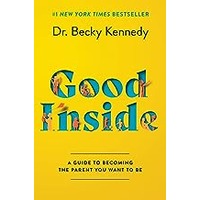Good Inside by Becky Kennedy EPUB & PDF – eBook Details Online
- Status: Available for Free Download
- Authors: Becky Kennedy
- Language: English
- Genre: Humanistic Psychology
- Format: PDF / EPUB
- Size: 2 MB
- Price: Free
Good Inside
Let me share an assumption I have about you and your kids: you are all
good inside. When you call your child “a spoiled brat,” you are still good
inside. When your child denies knocking down his sister’s block tower
(even though you watched it happen), he is still good inside. And when I
say “good inside,” I mean that we all, at our core, are compassionate,
loving, and generous.
The principle of internal goodness drives all of my
work—I hold the belief that kids and parents are good inside, which allows
me to be curious about the “why” of their bad behaviors. This curiosity
enables me to develop frameworks and strategies that are effective in
creating change. There is nothing in this book as important as this principle
—it is the foundation for all that’s to come, because as soon as we tell
ourselves, “Okay, slow down . . . I’m good inside . . . my kid is good inside
too . . . ,” we intervene differently than we would if we allowed our
frustration and anger to dictate our decisions.
The tricky part here is that it’s remarkably easy to put frustration and
anger in the driver’s seat. While no parent wants to think of herself as
cynical or negative or assuming the worst of her kids, when we’re in the
throes of a tough parenting moment, it’s common to operate with the
(largely unconscious) assumption of internal badness. We ask, “Does he
really think he can get away with that?” because we assume our child is
purposefully trying to take advantage of us. We say, “What is wrong with
you?” because we assume there’s a flaw inside our kid. We yell, “You know
better!” because we assume our child is purposely defying or provoking us.
And we berate ourselves in the same way, wondering, “What is my
problem? I know better!” before spiraling into a puddle of despair, selfloathing, and shame.
Plenty of parenting advice relies on perpetuating this assumption of
badness, focusing on controlling kids rather than trusting them, sending
them to their rooms instead of embracing them, labeling them as
manipulative rather than in need. But I truly do believe that we are all good
inside. And let me be clear:
seeing your child as good inside does not
excuse bad behavior or lead to permissive parenting. There’s a
misconception that parenting from a “good inside” perspective leads to an
“anything goes” approach that creates entitled or out-of-control kids, but I
don’t know anyone who would say, “Oh well, my kid is good inside, so it
doesn’t matter that he spit at his friend,” or “My kid is good inside, so who
cares that she calls her sister names.” In fact, the opposite is true.
Understanding that we’re all good inside is what allows you to distinguish a
person (your child) from a behavior (rudeness, hitting, saying, “I hate
you”). Differentiating who someone is from what they do is key to creating
interventions that preserve your relationship while also leading to impactful
change.
Assuming goodness enables you to be the sturdy leader of your family,
because when you’re confident in your child’s goodness, you believe in
their ability to behave “well” and do the right thing. And as long as you
For More Read Download This Book
EPUB



